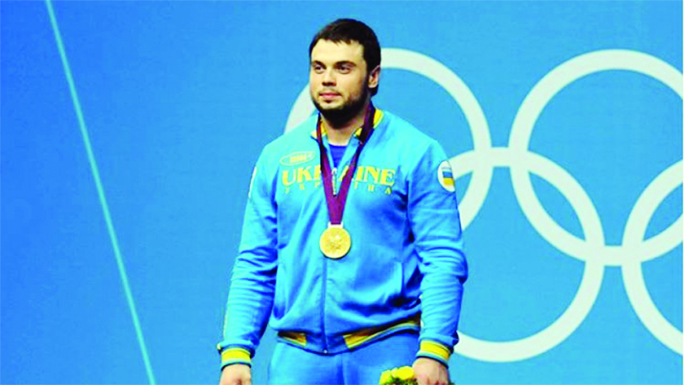
AP, Lausanne :
Ukrainian weightlifter Oleksiy Torokhtiy has been stripped of the gold medal he won at the 2012 Olympics and banned for doping.
The International Olympic Committee said Thursday that the Ukrainian tested positive for the banned steroid turinabol when his sample from the 2012 London Games was retested using modern methods. Torokhtiy gets a two-year ban backdated to start from December 2018, when the International Weightlifting Federation first announced he was under suspicion and placed him on provisional suspension. Torokhtiy is the fifth weightlifting gold medalist from the London Games to test positive.
Iranian lifter Navab Nasirshelal is in line to inherit Torokhtiy’s gold in the men’s 105-kilogram category, but reallocating the medals still needs to be ratified by the IOC.
Poland’s Bartolomiej Bonk could be upgraded from bronze to silver, but another open doping case makes the bronze medal position an open question.
The original fourth-place finisher, Uzbekistan’s Ruslan Nurudinov is under investigation after testing positive for the same steroid as Torokhtiy, so the medal could end up with another Uzbek, fifth-placed Ivan Efremov.
Torokhtiy stopped competing after the 2012 Olympics, but the doping case has disrupted his prolific career as a sports official.
Torokhtiy was previously vice-president of the Ukrainian Weightlifting Federation and also held roles with the European Weightlifting Federation and the Ukrainian Olympic Committee. The doping ban means he’s barred from holding any posts in sports bodies.
Since the IOC decision in 2016 to start retesting samples from the 2008 and 2012 Olympics, more than 50 weightlifters have been disqualified after testing positive for banned steroids.
The IOC had said weightlifting’s presence at future Olympics was under threat because of its vast steroid problem. However, the IOC backed down in March after the IWF promised to introduce stricter drug testing.
Ukrainian weightlifter Oleksiy Torokhtiy has been stripped of the gold medal he won at the 2012 Olympics and banned for doping.
The International Olympic Committee said Thursday that the Ukrainian tested positive for the banned steroid turinabol when his sample from the 2012 London Games was retested using modern methods. Torokhtiy gets a two-year ban backdated to start from December 2018, when the International Weightlifting Federation first announced he was under suspicion and placed him on provisional suspension. Torokhtiy is the fifth weightlifting gold medalist from the London Games to test positive.
Iranian lifter Navab Nasirshelal is in line to inherit Torokhtiy’s gold in the men’s 105-kilogram category, but reallocating the medals still needs to be ratified by the IOC.
Poland’s Bartolomiej Bonk could be upgraded from bronze to silver, but another open doping case makes the bronze medal position an open question.
The original fourth-place finisher, Uzbekistan’s Ruslan Nurudinov is under investigation after testing positive for the same steroid as Torokhtiy, so the medal could end up with another Uzbek, fifth-placed Ivan Efremov.
Torokhtiy stopped competing after the 2012 Olympics, but the doping case has disrupted his prolific career as a sports official.
Torokhtiy was previously vice-president of the Ukrainian Weightlifting Federation and also held roles with the European Weightlifting Federation and the Ukrainian Olympic Committee. The doping ban means he’s barred from holding any posts in sports bodies.
Since the IOC decision in 2016 to start retesting samples from the 2008 and 2012 Olympics, more than 50 weightlifters have been disqualified after testing positive for banned steroids.
The IOC had said weightlifting’s presence at future Olympics was under threat because of its vast steroid problem. However, the IOC backed down in March after the IWF promised to introduce stricter drug testing.

